 Libri di Annette Wieviorka su Unilibro.it
)
Libri di Annette Wieviorka su Unilibro.it
)
|
|
2018 |
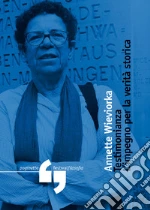 Title :
Testimonianza. L'impegno per la verità storica
Title :
Testimonianza. L'impegno per la verità storicaAuthor: Wieviorka Annette Publisher: Consorzio Festivalfilosofia Quali sono le fasi principali della storia della testimonianza e, soprattutto, qual è il rapporto tra testimonianza e storia? Imperativo sociale e prospettiva giudiziaria sono gli elementi essenziali della costruzione di una verità storica. € 3,50
|
|
|
2014 |
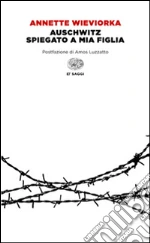 Title :
Auschwitz spiegato a mia figlia
Title :
Auschwitz spiegato a mia figliaAuthor: Wieviorka Annette; Sessi F. (cur.) Publisher: Einaudi Perché i nazisti spesero tante energie per sterminare milioni di uomini, donne e bambini, soltanto perché erano ebrei? Perché Hitler riteneva gli ebrei la maggior minaccia per il Terzo Reich? Chi sapeva quello che succedeva e chi poteva fare qualche cosa? Perché gli ebrei non hanno opposto resistenza? Annette Wieviorka risponde alle domande di sua figlia Mathilde su Auschwitz e la distruzione degli ebrei d'Europa. Domande crude e dirette che esprimono l'incredulità di chi non può concepire l'assurda tragedia dei lager nazisti. € 10,00
Scontato: € 9,50
|
|
|
1910 |
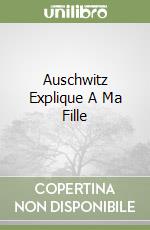 Title :
Auschwitz Explique A Ma Fille
Title :
Auschwitz Explique A Ma FilleAuthor: WIEVIORKA ANNETTE Publisher: Volumen AUSCHWITZ EXPLIQUE A MA FILLE - WIEVIORKA ANNETTE - Volumen € 9,00
|
|
|
2006 |
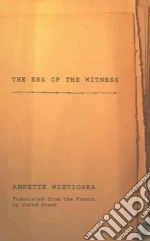 Title :
The Era of the Witness
Title :
The Era of the WitnessAuthor: Wieviorka Annette, Stark Jared (TRN) Publisher: Cornell Univ Pr What is the role of survivor testimony in Holocaust remembrance? Today such recollections are considered among the most compelling and important historical sources we have, but this has not always been true. In The Era of the Witness, a concise, rigorously argued, and provocative work of cultural and intellectual history, Annette Wieviorka seeks to answer this surpassingly complex question. She analyzes the conditions under which survivor testimonies have been produced, how they have been received over time, and how the testimonies shaped the construction of history and collective memory. Wieviorka discerns three successive phases in the evolution of the roles and images of the Holocaust witness. The first phase is marked by the testimony left by those who did not survive the Holocaust but managed nevertheless to record their experiences. The second, most important, phase is centered on the Eichmann trial, which for Wieviorka is the moment (1961–1962) when a broad cultural deafness to survivors' stories was replaced by the image of the witness as 'bearer of history.' The author follows the changing nature of the witness into a third phase, which she calls 'the era of the witness.' Especially concerned with the pedagogical and political uses to which survivor testimony has been put, Wieviorka examines factors that determine when and how survivor testimonies are incorporated into the larger narrative of the Holocaust, according it a privileged place in our understanding. By exploring the ways in which the Holocaust is remembered, The Era of the Witness also deepens our understanding of how testimony can help to define not only twentieth-century history but also more recent episodes of mass killing that are only now 'becoming history.' € 22,60
|
|
|
2005 |
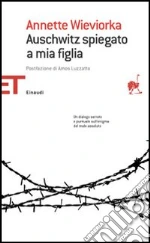 Title :
Auschwitz spiegato a mia figlia
Title :
Auschwitz spiegato a mia figliaAuthor: Wieviorka Annette; Sessi F. (cur.) Publisher: Einaudi Perché i nazisti spesero tante energie per sterminare milioni di uomini, donne e bambini, soltanto perché erano ebrei? Perché Hitler riteneva gli ebrei la maggior minaccia per il Terzo Reich? Chi sapeva quello che succedeva e chi poteva fare qualche cosa? Perché gli ebrei non hanno opposto resistenza? Annette Wieviorka risponde alle domande di sua figlia Mathilde su Auschwitz e la distruzione degli ebrei d'Europa. Domande crude e dirette che esprimono l'incredulità di chi non può concepire l'assurda tragedia dei lager nazisti. € 9,00
|
|
|
1999 |
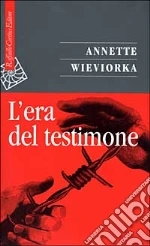 Title :
L'era del testimone
Title :
L'era del testimoneAuthor: Wieviorka Annette Publisher: Raffaello Cortina Editore In tutti i ghetti della Polonia invasa dai nazisti, gli ebrei cominciarono a scrivere, a raccontare, a raccogliere le loro testimonianze, nella consapevolezza che la loro esperienza potesse passare alla storia solo attraverso questo lavoro di registrazione di ciò che stavano vivendo. Eppure, dovette passare molto tempo dopo la fine della Seconda guerra mondiale affinchè i testimoni ebrei dei Lager nazisti venissero ascoltati. L'autrice, partendo da questa considerazione, ricostruisce la storia della figura del testimone della Shoah, e pone vari interrogativi sul rapporto tra storia e memoria, sul ruolo dello storico dinanzi al testimone, su che cos'è storia e che cos'è testimonianza. € 19,00
Scontato: € 18,05
|